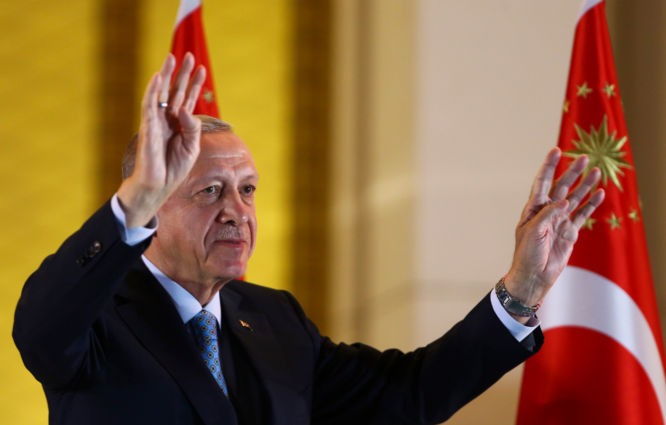Turkish President Recep Tayyip Erdogan won five more years to lead the NATO-member nation at Europe’s crossroads.
In Sunday’s presidential runoff, Erdogan won more than 52% of the vote two weeks after losing the first round. He defeated Kemal Kilicdaroglu in the second round, indicating support for a strong, established leader.
Voters were divided between allegiance to Erdogan, who has reigned for two decades, and aspirations for the opposition candidate, who vowed to return to democratic principles, embrace more traditional economic policies, and better ties with the West.
Erdogan must now deal with increasing prices and rebuild after a terrible earthquake that killed over 50,000 people.

Erdogan praised the country in Istanbul and Ankara for re-electing him. “We hope to be worthy of your trust, as we have been for 21 years,” he told supporters outside his Istanbul house on a campaign bus.
Despite saying the election was finished, he continued to attack his opponent.
“The only winner today is Turkey,” Erdogan declared outside the presidential palace in Ankara, pledging to work hard for Turkey’s second century, which he termed the “Turkish century.” The nation turns 100 this year.
The economy, which has suffered from Erdogan’s unorthodox policies, is a major issue. In 11 provinces devastated by the Feb. 6 earthquake, he must oversee major restoration operations.
Kilicdaroglu called the election “the most unjust ever,” with all state resources deployed for Erdogan. “Until real democracy comes to our country,” he remarked in Ankara. He praised the almost 25 million people who voted for him and begged them to “remain upright.”
Kilicdaroglu claimed the people “wanted to change an authoritarian government despite all the pressures”.
Erdogan’s supporters celebrated by waving Turkish or governing party flags, blaring automobile horns, and singing his name. Several Istanbul neighborhoods celebrated with gunshots.
His next term will include more careful negotiation with NATO members over the alliance’s future and the Ukraine crisis.
Turkey and Erdogan’s increased worldwide influence was noted by international leaders’ congratulations.
Israel’s President Isaac Herzog tweeted, “Congratulations to President Erdogan of Türkiye on his election victory.” I’m sure we’ll keep working to improve Türkiye-Israel relations.

Western lawmakers say they are willing to cooperate with Erdogan despite years of sometimes strained relations. Turkey holds Sweden’s NATO dreams. A deal to enable Ukrainian grain exports and prevent a worldwide food catastrophe depends on the desire to expand the military alliance against Russia.
Erdogan declared in Istanbul, “Nobody can look down on our nation.”
As it seeks demands from the United States, Turkey may “move the goal post” on Sweden’s NATO membership, according to Steven A. Cook, a senior fellow at the Council on Foreign Relations in Washington.
He also suggested Erdogan, who has talked about adopting a new constitution, will likely push harder to lock in AKP revisions.
Erdogan pledged to rehabilitate earthquake-ravaged communities in his victory speech. He also predicted a million Syrian refugees will return to Turkish-controlled “safe zones” in Syria as part of a resettlement deal with Qatar.
Conservative voters remain loyal to Erdogan for enhancing Islam’s visibility in secular Turkey and increasing the country’s influence in international affairs.
Since 2010, the pro-secular Republican People’s Party, or CHP, has been led by Erdogan’s opponent, a mild-mannered former civil servant. The opposition took months to rally around Kilicdaroglu. He and his party have lost all Erdogan-run elections.
Kilicdaroglu promised to deport refugees home and ruled out peace talks with Kurdish terrorists if he won the runoff.
Erdogan and pro-government media accused Kilicdaroglu, who was backed by the pro-Kurdish party, of conspiring with “terrorists” and advocating “deviant” LGBTQ rights.
In his victory address, Erdogan reiterated that LGBTQ persons cannot “infiltrate” his ruling party or its nationalist supporters.
Turkey’s future is bright, according to Erdogan voter Hacer Yalcin in Ankara.
“Of course Erdogan wins… Someone else? Yalcin stated, “He made everything for us.” “God blesses!”
Erdogan, a 69-year-old Muslim, will rule until 2028.
He barely won a 2017 referendum that abolished Turkey’s parliamentary system, making the president dominant. In 2014, he became the first directly elected president, and in 2018, he won the executive presidency.
Economic development and EU discussions in the early half of Erdogan’s term moved many out of poverty.
He later suppressed liberties and the media and consolidated authority, notably following a failed coup attempt Turkey blames on U.S.-based Islamic preacher Fethullah Gulen. The priest denies responsibility.
In Diyarbakir, 37-year-old metalworker Ahmet Koyun stated, “It is sad on behalf of our people that a government with such corruption, such stains, has come into power again.” Mr. Kemal would have been good for our country, at least for a change.”
But he stated the findings must be accepted.

